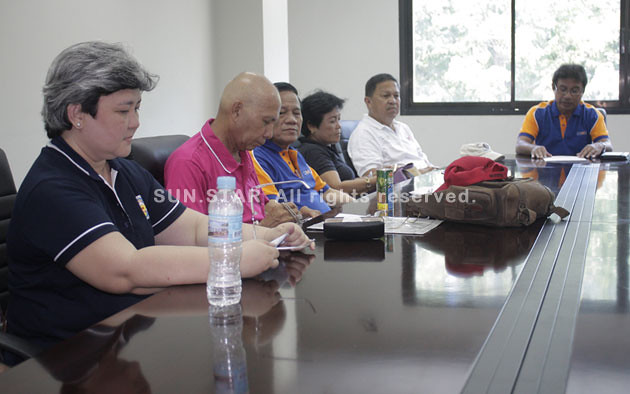By Loui S. Maliza
Tuesday, October 4, 2011OF THE 119 electric cooperatives in Northern Mindanao, only 14 are officially registered with the Cooperative Development Authority (CDA) enjoying tax exemptions, but the remaining 105 refused supervision “due to automatic end of perks and exorbitant salaries and allowances of board and management officers.”
Lawyer Isidro Lico, Ating-Koop representative, said the cooperative bloc in Congress is “fighting hard” for the inclusion of electric cooperatives in the list under the CDA’s watch, noting consumers should be recognized as one of the owners of the power utilities that should be entitled to investment returns.

CAGAYAN DE ORO. Ating-Koop partylist Representative Isidro Lico (third
from left) leads cooperative leaders in Northern Mindanao in addressing
queries from the press during a media briefing Sunday, inside the
Misamis Oriental Cooperative Bank in Capitol Compound, Cagayan de Oro
City. (Joey P. Nacalaban)
“We have already requested the Department of Energy (DOE) and the Energy Regulatory Commission (ERC) (to urge the electric cooperatives to register with the CDA). I hope they will stand by their promise,” Lico said over a called press conference during Sunday’s kick off of the Cooperative Month celebration this October.
Officials of the CDA in Northern Mindanao claimed the 105 “fake cooperatives don’t care about the welfare of the consumers and its officials are into filling only their own pockets with the consumers’ money and investment.”
Fake cooperatives, the CDA said, are those power utilities that embeds the name “cooperative” to the name of the power provider, “but did not follow the guidelines set by the CDA on organizational structure, which board and management officers could pay their services the amount as high as they want without consulting the general assembly.”
“This is the main reason why they do not want to be registered with the CDA, which charter observes the general assembly as the real owners of the cooperatives and has the control to determine the salaries and allowances of the board of directors and the management,” the CDA said.
The CDA even said higher-ups of electric cooperatives have nothing to worry about paying the taxes “because it is passed on to the consumers.”
Meanwhile, Lico explained, the people specifically the power consumers are “misinformed” of the benefits they could get as part owners of the electric cooperatives.
“Because they (board of directors) say that the National Electrification Administration’s (NEA) hand over the electric cooperatives would be wiped out when electric cooperatives register with the CDA. Actually, the NEA’s duty remains. What we want is that these electric cooperatives should recognize that the consumers are the real owners,” Lico said.
He cited that consumers are paying the capital expenditure (CAPEX) set by the electric cooperatives as form of investment “yet they are not receiving any investment returns.”
“We asked them (electric cooperatives) where did the CAPEX go, but they fail to present us the book of records (to justify the expenditures of CAPEX) and they said it went to ‘donated capital’. Donated capital, when you say donated capital, it was donated to a certain venture, but the recipient party of the donation did not know that there was actually a donation.
Now, it’s illegal. That’s why if they continue to do that, we will be forced to file a case against the electric cooperatives.”
With CDA registration, the people have nothing to worry on the power services by electric cooperatives, he added.
Lico further cited an electric cooperative in Palawan where a single consumer-businessman that largely depend on electricity, received not less than P60,000 investment return or dividend, “because he is recognized as part owner of the cooperative.”
He added that if a certain electric cooperative is CDA-registered, consumer-owners are given certificate of ownership as stock holders.
http://bit.ly/pgwufz
No comments:
Post a Comment